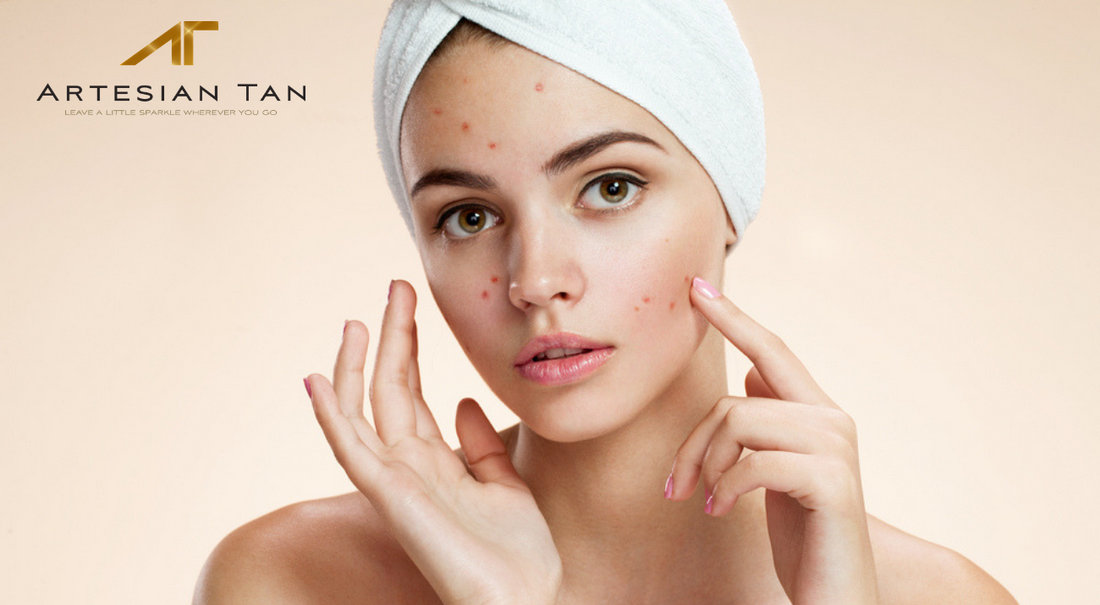
10 Tips to Finding a Sunscreen For Acne Prone Skin
Share
Exposure to the sun not only damages and ages your skin but can also cause melanoma, so it is utterly important to use sunscreen as protection. If, however, you are prone to acne, you may be hesitant to put on greasy sunscreen and potentially worsen your skin condition. That is why Artesian Tan has compiled a list of sunscreen requirements for healthy and acne-free skin.
Regardless of the season and the weather (yes, even if it is cloudy or raining), you should always use sunscreen. If you have oily skin, you are probably concerned that putting on sun protection will affect your face and aggravate your skin problems. However, the cause of 90% of skin aging is the sun. We will help you find the perfect sunscreen for acne prone skin and keep your youthful look and clear skin.
How to Choose the Best Sunscreen for Oily and Acne Prone Skin?
1. Only Use Face Sunscreen on Your Face
Do not, under any circumstances use body sun lotion on your face - they are heavier, greasier, and thicker. Get face sunscreen for oily skin and avoid breakouts.
2. Get an Oil-Free Product
Oil-free products are excellent for daily use, especially if you have oily skin as you will avoid adding additional oils. These products are lighter on the skin and will not block the pores.
3. Make Sure It Is Noncomedogenic
Noncomedogenic means the product will not clog your pores. Pores are tiny openings on your skin, and the oils can combine with dead skin cells (and bacteria), and block your pores. A "comedo" is a type of a pimple which forms on the skin.
Noncomedogenic sunscreen helps make your skin healthy on a couple of levels - it will break down excess oil from your skin, keep it hydrated, and protect you from harmful UV rays.
4. Use Fluids and Gels
If lotions are too greasy for you, we advise you to try fluids or gels since they are lightweight and aqueous. They soak up more quickly and leave no trace on the skin.

5. Look for Zinc and Titanium
Zinc and Titanium have a drying effect on the skin and are less irritating. They absorb oils, so it is almost guaranteed that you will avoid breakouts using these mineral sunscreens. They are generally safer for your health and not very likely to trigger skin reactions. Mineral sunscreens protect your skin by remaining on the surface and reflecting the light, not penetrating the skin and entering the bloodstream like some other sun lotions.
6. Use a Moisturizer with Sunscreen
You should be using a facial moisturizer anyway (if you are not, it's about time you start). You will kill two birds with one stone if you find a moisturizer with sun protection.
7. Combine Your Skin Care Products and Sunscreen
Acne can make you susceptible to sunburn, so you should apply your acne medication, and then, after 20 minutes, apply sunscreen over it.
8. Powder Sunscreen Over Your Makeup
If you use makeup, the good fit for you may be the powder sunscreen. They are a fairly new invention, but benefits make them stand out -- they are easy to combine with makeup, you don't need to wait for them to start working or soak in, are very easy to reapply, and they can be tinted (in various shades), so you can use them instead of your face powder.
9. Use at Least Spf 30
Remember that the SPF indicates how long you are protected from UV rays and implies how often you should put on the sunscreen. Most of us do not reapply as often as we should, so choose SPF of at least 30, to remain carefree and protected. Pick a product that protects from both UVA and UVB light.
10. Experiment till You Find Your Fit
You will most certainly have to explore and test a few products before you find the one that perfectly fits your skin. Do not give up and do not hesitate to invest in healthy skin. Your ideal sunscreen for acne-free skin is out there, you just need to find it.
Your skin is our priority. We would love to hear if our tips have helped you in having clear and healthy skin. Let us know!
